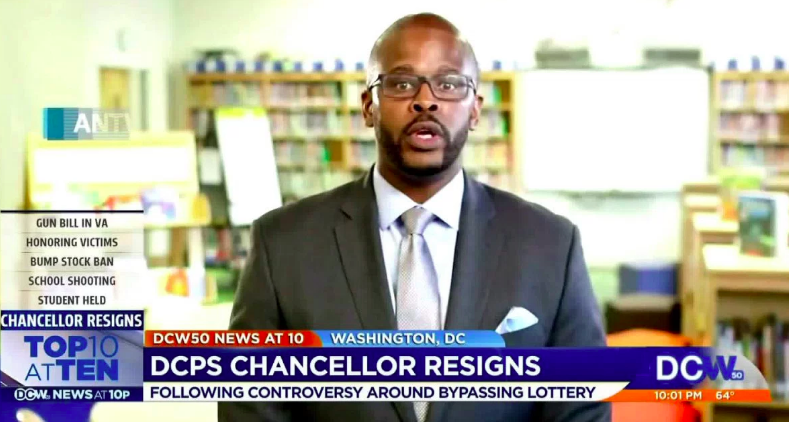Washington, D.C. was once again in the national spotlight recently, though this time the dysfunction and chaos stemmed not from Congress, but city government. At Ballou High School, in Southeast DC, a third of diplomas were fraudulently handed out to students. The diploma mill papers over the shockingly poor state of education provided in the nation’s capital. For example, out of all DC Public Schools (DCPS), only one out of seven students are deemed proficient in math.
The embarrassing revelation should serve as a wake-up call to Mayor Muriel Bowser. The current state of public education is such a mess, and the utter lack of proper oversight so glaring, that the FBI stepped in to investigate the issue. This is likely to have little effect on Mayor Bowser’s reelection campaign later this year.
To further muddy the situation, DCPS Chancellor Antwan Wilson succumbed to pressure to resign amidst public outrage that he gamed the lottery system to admit his children to a higher performing school. Wilson entered the job with an itinerary to clean the system; he instead contributed to the mess. His removal will help quicken the healing process.
While the revelations of fraud are dismaying, the news does have the potential to bring awareness to the lack of funding and resources available to public high schools in Southeast.
DC Income
For those born in families able to afford the exorbitantly expensive day-schools in Northwest, including Sidwell Friends, Cathedral Heights, and Georgetown Day School, concerns of getting into a good college or finding a good job were eliminated years before they entered high school. Even public schools in Northwest DC are privy to exceedingly better facilities, better administrative stability, more advanced curriculum, and generally more robust school resources. This translates into performance metrics as well. Graduation rates at Wilson High School in Northwest are double those of Ballou or Anacostia High Schools.
With derelict funding streams and increasing pressure to reduce high school truancy, the top job as a high school principal in underperforming schools is unenviable – and turnover is increasing. Anacostia High School has had three different principals in six years. This adds to the turbidity, leading to a less effective learning environment for students and an uncertain one for teachers. The current principal of Anacostia High, Eric Fraser, shows promising talent. But the job must be made easier for him and other school leaders.
To do so, the city government must first address the failures that led to the fraudulent diplomas handed out at Ballou High School. Instead of inflating its already below-average graduate rate, school statistics should accurately reflect the cohort. Anything but full transparency will only hurt the school and the students. Mayor Bowser and the convening City Council of DC should move to establish a permanent oversight body, much like ex-Chancellor Wilson’s Office of Integrity, to ensure educational transparency and results for the foreseeable future.
Secondly, residents and families living in Northwest should be asked to provide more for the students in Southeast. Progressive instruments such as municipal tax revenue sharing, used in Minneapolis with admirable results, in effect sends excess tax streams to areas that are in need. This innovative policy is a good idea to explore.
Finally, efforts must be made to mitigate what Brookings scholar Richard Reeves describes as Dream Hoarding – policies like school zoning, college legacy preferences, and familial internship connections that overwhelmingly benefit the upper-middle and upper class. Schools in Northwest should be compelled to work directly with Southeast schools. Many schools east of the river do not have the luxury of offering students after-school clubs in robotics, foreign languages, or even a fully stocked band. Scholastic competitions, peer-to-peer networking, and dual enrollment programs should be leveraged to connect the students in the two regions. Northwest schools should foot the bill for busing the students to and from as well. If the school boards in the enclaves of Northwest won’t move for these reforms, policymakers should.
Conversations should be had over the causes of this urban planning failure, especially as neighborhoods devoid of investment and left behind economically are often of majority-minority. Meanwhile, the forces of gentrification are pushing residents out of long-held communities. These conversations should lead to the passage and implementation of policies that provide students in Southeast with resources that should be made available to every student: apprenticeships, summer immersion camps, dual enrollment, a robust and available guidance counselor system, a well-paid staff and teachers.
The issue at hand here is separation. Residents of DC should be outraged at the lack of services provided for the students in Southeast, and the lack of investment in our city’s next generation.
Jacob Ford is a first year Master of Public Policy student from Pittsburgh. He majored in mathematics at Allegheny College, then moved to Washington, DC to work as a financial analyst. His policy interests include political economy, income mobility, and microfinancing. In his spare time, Jake enjoys exploring new areas of DC, playing guitar, and whittling down on the endless list of classics on his bookshelf.

Lots of big thoughts here without much to back them up! Can you please support this claim? ” Even public schools in Northwest DC are privy to exceedingly better facilities, better-paid teachers and administrators, more advanced curriculum, and more school resources.”
Careful reader, I agree with you in regards to the “better-paid teachers and admin” portion of your statement. Teacher/admin salaries are standard across the district. In fact, if you teach in a high-needs school, you are subject to much higher bonuses, based on your performance.